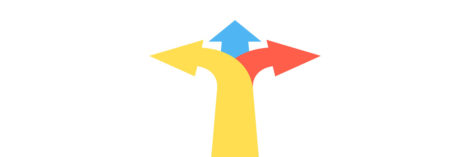Statistics on business creation in Europe show that the Covid crisis has not discouraged entrepreneurs from starting up. A survey conducted on 825 business creators shows that their confidence is at its highest. However, they are less experienced, make less use of external support and abandon public financing. This extensive research also allows us to appreciate other changes that have occurred since March 2020, such as replacing public funding with private aid.
This first article provides detailed results for Belgium, a country where we surveyed 634 entrepreneurs.
The results in a Nutshell
- Confidence levels among those who launched their business after March 2020 are up sharply. “Covid entrepreneurs” are 12 points more confident about the future and 14 points more optimistic about the success of their business than those who started their business before March 2020.
- The motivations for starting a business do not fundamentally change with Covid. The search for autonomy and flexibility was the motivation of 45.5% of entrepreneurs before the crisis. It remains so at 43% since March 2020.
- Since the Covid crisis, business creators in Belgium have been relying less on public aid (-10 points) and more on private financing (+4 points). The proportion of public assistance under €5000 has doubled (+29 points), while private funding under €5000 has decreased by 14 points.
- The profile of entrepreneurs who started since March 2020 is less experienced. There has been a 5-point increase in the share of entrepreneurs with less than one year of work experience and an equivalent decrease in those with more than 20.
- The share of employees who started their business increased by 7.5 points (to 59.6%) while that of the unemployed decreased by 5 points (to 18.2%)
- Post-Covid entrepreneurs are more educated. The share of those with a 1st, 2nd, or 3rd cycle degree rises to 67.5%, up almost 7 points compared to the pre-Covid period.
- Since March 2020, even fewer entrepreneurs have sought support for the launch of their business. The percentage of unassisted entrepreneurs has increased from 31.8% to 38.5%. The accountant remains the number one referent for more than a third of business creators.
- Since the COVID crisis, business creators have been relying more on private financial support (21% versus 17%)
- The amount of this private financing tends to increase. The share of private support of less than 5000€ has gone from 57% to 43%.
- The use of public financing is in apparent decline (-10 points). Before the crisis, 73% of the creators of businesses launched without resorting to this mode of financing. Since the crisis of Covid, they are 83% to do without it.
- Among those who have obtained public aid, the amounts below 5000€ are those whose proportion has increased the most (57% against 28% before the crisis). This has been done at the expense of more important aids (between 5000€ and 20000€)
crédits : Shutterstock
Methodology
A survey was realized using 825 business creators in Belgium and France. The survey was distributed in Belgium by UCM and Hub.Brussels, in France by Formalizi. Confidence was measured by reusing part of the INSEE methodology for measuring household confidence.
The results presented in this article are limited to Belgium. They concern 634 business creators who responded to the survey. Of these, 31% had started their business before March 2020 (“pre-Covid” period) and 69% since March 2020 (“post-Covid” period).
crédits : Shutterstock
What motivates entrepreneurs to launch their business?
Below we present the detailed results that support our conclusions about the entrepreneurial dynamics in Belgium. In most of the graphs, we distinguish the period “before Covid” (businesses created before February 28, 2020) from the period “since Covid.”
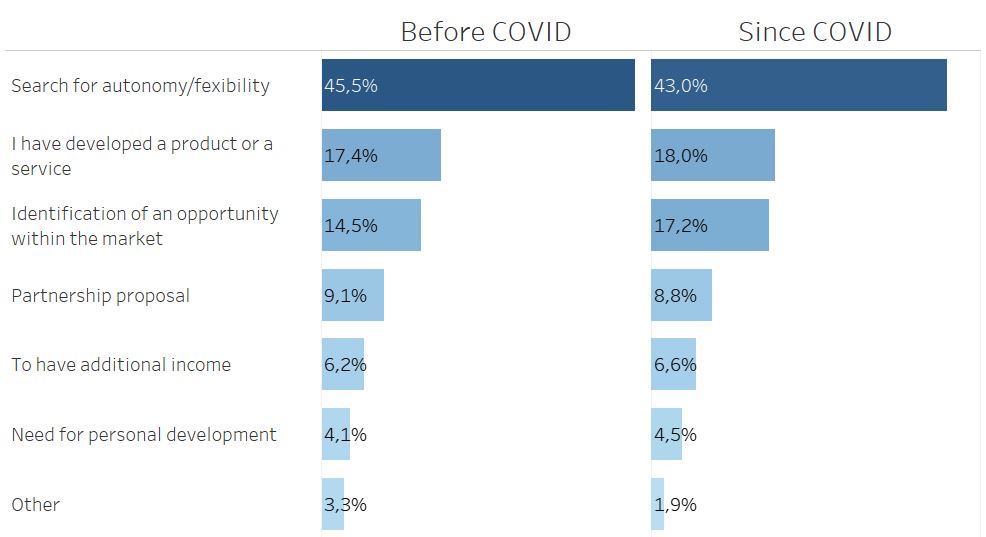
As can be seen in the graph above, the motivations of business creators remain essentially the same, both before and since the Covid crisis. The search for autonomy and flexibility is the primary motivation for less than half of the new entrepreneurs.

Only 14% of Belgian business founders say that the Covid crisis influenced their decision to start a business. This result is probably related to the following statistic.
Business confidence is rising

56.8% of entrepreneurs who started since March 2020 say they are confident or very confident about the future. This is 12 points higher than those who started their business before the Covid crisis (44.8%).

Entrepreneurs who launched since March 2020 are 14 points more confident in the success of their business than those who launched before March 2020 (72.2% versus 58.2%).
The profile of entrepreneurs has changed since the Covid crisis
Since March 2020, the proportion of employees who have become entrepreneurs has increased by more than 7 points, from 52% to 59.6%. At the same time, the balance of unemployed has decreased by 5 points, from 23.2% to 18.2%.
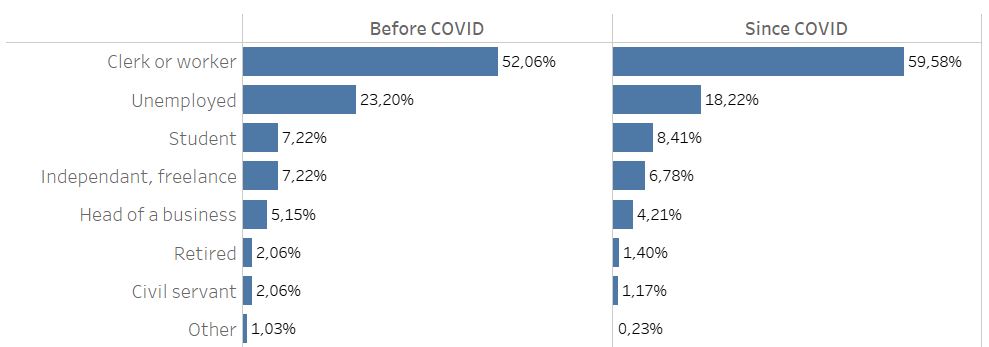
Those who started since March 2020 tend to be more highly educated than their predecessors. In particular, there has been a sharp increase in those with an undergraduate degree, whose proportion has risen from 24.7% to 36.4% (see chart below).
The holders of a university degree (1st, 2nd, or 3rd cycle) represent more than 2/3 of the business creators in Belgium (67,5%). The increase compared to the “pre-Covid” period is remarkable (+7 points).
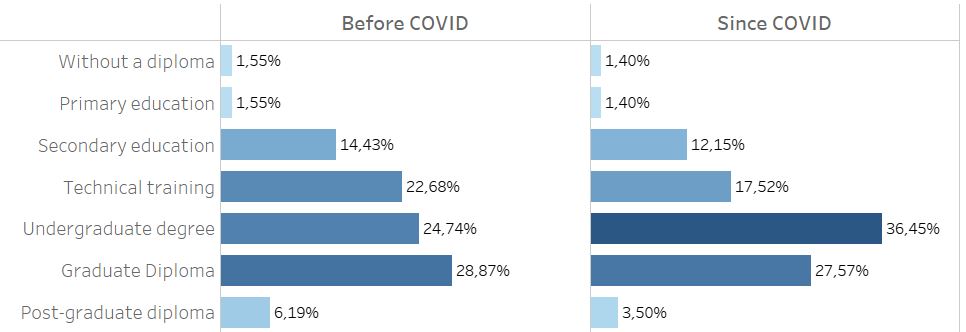
While business founders are more highly educated since March 2020 in Belgium, they are also less experienced. The percentage of young graduates (<1 year of professional experience) rises to almost 20%, up 5 points. At the same time, there has been an equivalent decrease in those with more than 20 years of experience.

4/5 of the entrepreneur’s startup alone. Only 5% of entrepreneurs start their business with 2 or more partners.

38,5% of entrepreneurs not accompanied since the Covid
More worryingly, nearly 40% of business founders are not supported at all. This percentage has risen sharply since March 2020, which does not bode well for the future of these businesses. About 1/3 of the new structures are accompanied only by the accountant. This reveals a definite deficit in the non-financial aspects of the entrepreneurial adventure.
The use of coaches and consultants has decreased by 3 points; now, only 1 entrepreneur out of 10 uses them. This is still more than the use of entrepreneurial support organizations, which now attract only 7.5% of business creators.
An accurate reflection must therefore be carried out to reach the 38.5% of business creators who do not use support and thus mortgage their chances of success (see on this subject our statistics on the survival of start-ups and the importance of market research).
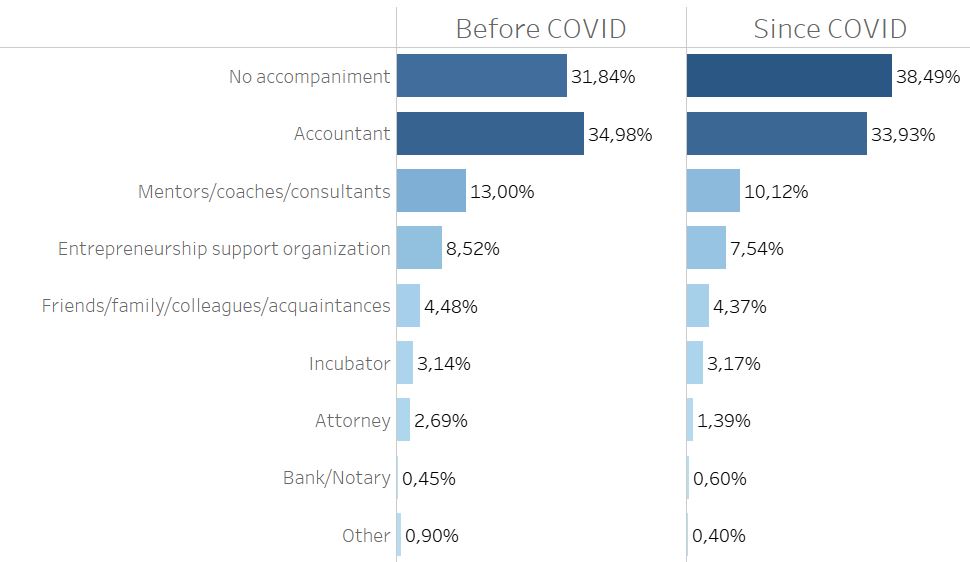
The lack of accompaniment cannot be due to previous entrepreneurial experience since the percentage of neo-entrepreneurs remains stable. More than 9 out of 10 entrepreneurs have never started a business before.

This does not prevent project holders from quickly moving on to the realization of their projects. Indeed, for almost 3/4 of the businesses in Belgium, less than a year elapses between the idea and the actual launch of the activity. This percentage is slightly higher for businesses created after March 2020 (73.1% versus 71.6%).

Less public funding and more private support
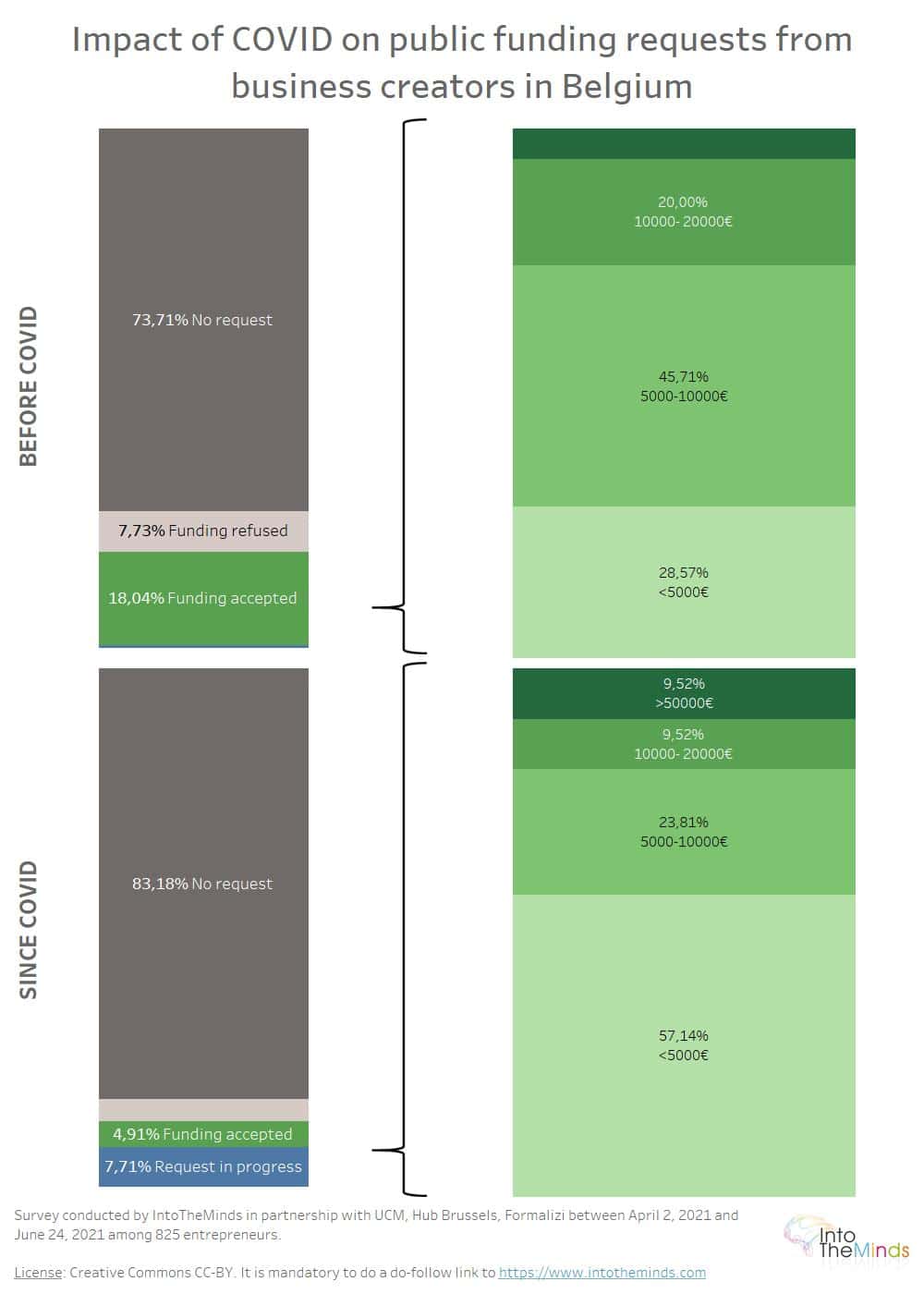 The survey shows that more than 83% of business founders have not applied for public financial aid (click on the image to enlarge). This percentage has increased slightly since the Covid crisis.
The survey shows that more than 83% of business founders have not applied for public financial aid (click on the image to enlarge). This percentage has increased slightly since the Covid crisis.
We also see that when aid is granted, the amounts are decreasing. Since Covid, 57% of the files concern amounts of less than 5000€, a percentage that has doubled compared to the pre-Covid period.
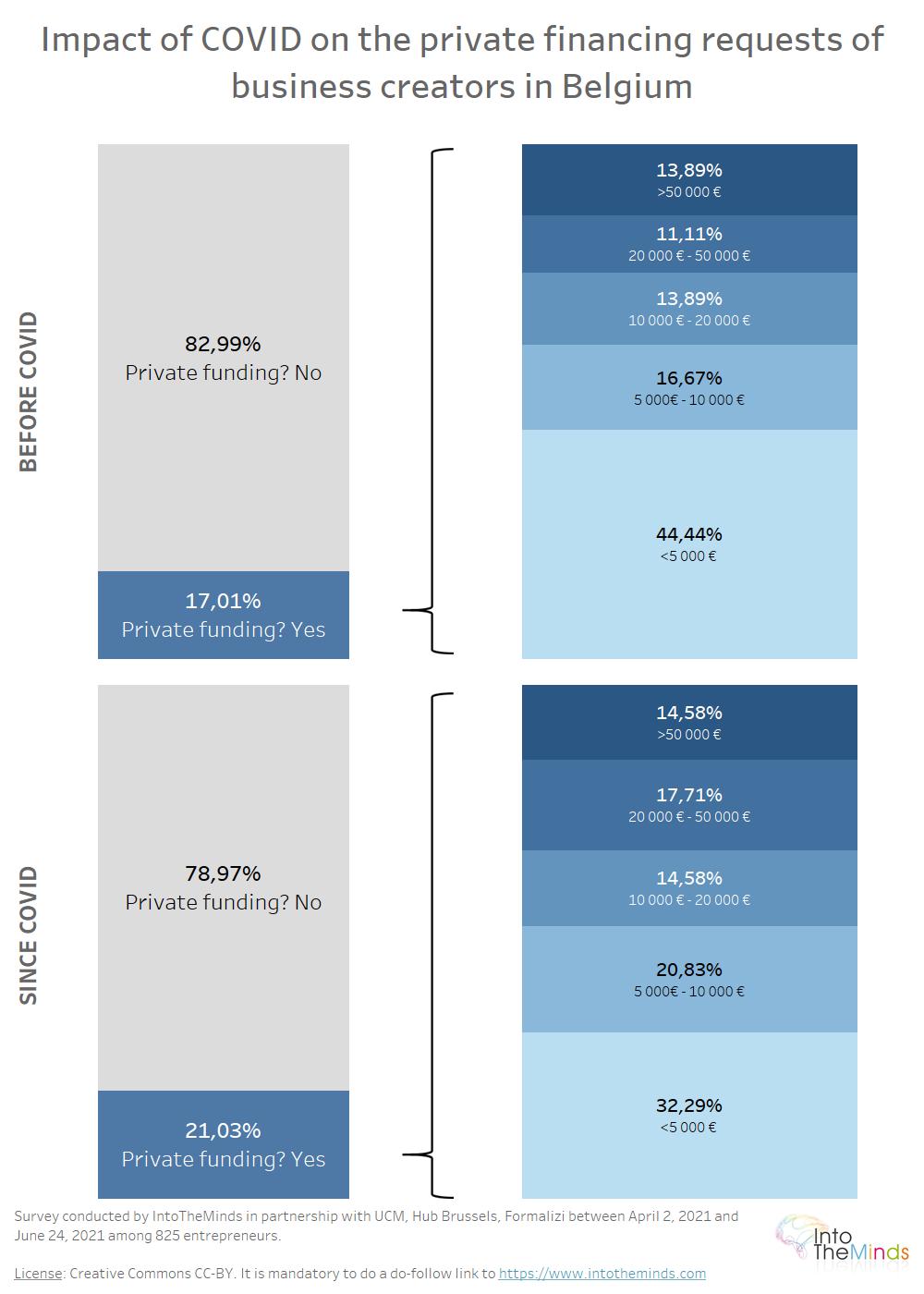 Since the Covid crisis, the use of private financial support has increased by 4 points (click on the image to enlarge).
Since the Covid crisis, the use of private financial support has increased by 4 points (click on the image to enlarge).
In terms of amounts, the trend observed is the opposite of public support: the amounts obtained have tended to increase since the Covid crisis. Since March 2020, in 67% of the cases, the private support is higher than 5000€. Before March 2020, this percentage was 55.5%.
Posted in Research.
